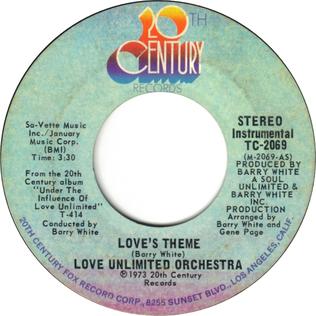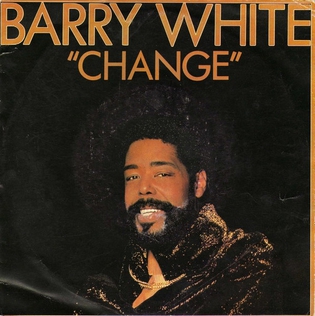
Barry Eugene Carter, better known by his stage name Barry White, was an American singer and songwriter. A two-time Grammy Award winner known for his bass voice and romantic image, his greatest success came in the 1970s as a solo singer and with the Love Unlimited Orchestra, crafting many enduring soul, funk, and disco songs such as his two biggest hits: "Can't Get Enough of Your Love, Babe" and "You're the First, the Last, My Everything".

The O'Jays are an American R&B group from Canton, Ohio, formed in 1958 and originally consisting of Eddie Levert, Walter Lee Williams, William Powell, Bobby Massey, and Bill Isles. The O'Jays made their first chart appearance with the minor hit "Lonely Drifter" in 1963, but reached their greatest level of success once the producers Gamble & Huff signed them to their Philadelphia International label in 1972. With Gamble & Huff, the O'Jays emerged at the forefront of Philadelphia soul with Back Stabbers (1972), and topped the US Billboard Hot 100 the following year with "Love Train". Several other US R&B hits followed, and the O'Jays were inducted into the Vocal Group Hall of Fame in 2004, The Rock and Roll Hall of Fame in 2005, and the Rhythm and Blues Music Hall of Fame in 2013.

Maurice White was an American musician, best known as the founder, leader, main songwriter and chief producer of the band Earth, Wind & Fire, also serving as the band's co-lead singer with Philip Bailey.

Sugar, Sugar is a song written by Jeff Barry and Andy Kim. It was originally recorded by the Archies, a fictional band of studio musicians linked to the 1968–69 US Saturday morning TV cartoon The Archie Show, inspired by the Archie Comics. In the autumn of 1969 the single topped both Billboard's Hot 100 and the UK Singles Chart, ranking number one for the year in both America and Britain. “Sugar, Sugar” is the most successful bubblegum pop single of all time, and is widely regarded as the apotheosis of the late-1960s/early-1970s bubblegum music genre. In mid-1970 R&B/soul singer Wilson Pickett achieved success on both the US soul and pop charts with a cover version.

"Love Will Lead You Back" is a song recorded by American singer Taylor Dayne for her second studio album, Can't Fight Fate (1989). Written by Diane Warren and produced by Ric Wake, the song was released on January 12, 1990, by Arista Records as the second single from the album.

"It's in His Kiss" is a song written and composed by Rudy Clark. It was first released as a single in 1963 by Merry Clayton that did not chart. The song was made a hit a year later when recorded by Betty Everett, who hit No. 1 on the Cashbox magazine R&B charts with it in 1964. Recorded by dozens of artists and groups around the world in the decades since, the song became an international hit once again when remade by Cher in 1990.

"Woman in Love" is a song performed by Barbra Streisand and taken from her 1980 album Guilty. The song was written by Barry and Robin Gibb of the Bee Gees, who received the 1980 Ivor Novello award for Best Song Musically and Lyrically. It is her fourth of four Platinum records, and is considered her greatest international hit.

"Love's Theme" is an instrumental piece written by Barry White around 1965. Recorded and released as a single by White's Love Unlimited Orchestra in 1973, it was one of the few instrumental and purely orchestral singles to reach #1 on the Billboard Hot 100 chart in the United States, which it did in early 1974. Billboard ranked it as the #3 song for 1974.

"Can't Get Enough of Your Love, Babe" is a song written, recorded, and produced by American musician Barry White. Released in June 1974 as the first single from his third album, Can't Get Enough (1974), the song topped the US Billboard Hot 100 and Billboard R&B charts and has since become one of his signature tunes. It was his second US chart-topper, after "Love's Theme". It became a gold record in the US. White performed this song live on The Midnight Special in 1974, and on Soul Train on May 24, 1975.
The Love Unlimited Orchestra was a 40-piece string-laden orchestra formed by American singer Barry White, and serving as a backing unit for White and for female vocal trio Love Unlimited. From the early 1970s on, they also recorded several singles and albums under their own name.

The discography of English singer and songwriter Rick Astley consists of nine studio albums, five compilation albums, two remix albums, and twenty-four singles.

"I'm Gonna Love You Just a Little More Baby" is a song written, produced and recorded by Barry White.

From a Girl's Point of View We Give to You... Love Unlimited is the debut studio album of American soul vocal trio Love Unlimited, released in 1972 on Uni/MCA Records. Produced by soul recording artist Barry White, for whom the trio served as a backing group at the time, the album was arranged by White and conductor Gene Page. It was digitally remastered by recording engineer Bill Inglot and reissued on May 10, 1994 by Varèse Vintage.
Felice Taylor was an American soul and pop singer, best known for her recordings in the late 1960s.

Just Another Way to Say I Love You is the self-produced fourth album by American R&B singer Barry White, released in 1975 on the 20th Century label.

I've Got So Much to Give is the debut studio album by American R&B singer Barry White, released on March 27, 1973, on the 20th Century label.

The Man is the self-produced eighth album by soul singer Barry White, released in 1978 on the revived 20th Century-Fox Records label, which saw its name reverted from 20th Century.

Walkin' in the Rain with the One I Love was an R&B single in 1972 for the soul trio Love Unlimited, a studio group created by singer/producer Barry White. The main vocalists were female singers Glodean James, her sister, Linda James, and their cousin Diane Taylor. Glodean would eventually become White's wife in 1974; the couple would split up in 1988, though they never divorced.
"Move Me No Mountain" is a song written by Jerry Ragovoy and Aaron Schroeder. It was originally recorded in 1974 by Love Unlimited, a group organized and produced by Barry White. In 1975, Ragovoy arranged and produced a recording of the song by American singer Dionne Warwick. Warwick's version used a slightly different melody in the song's chorus than the melody sung by Love Unlimited, and this variation has been used on subsequent recordings of the song. In 1980, American singer Chaka Khan recorded a version of the song with production by Arif Mardin.

Change is Barry White's fourteenth studio album.

















